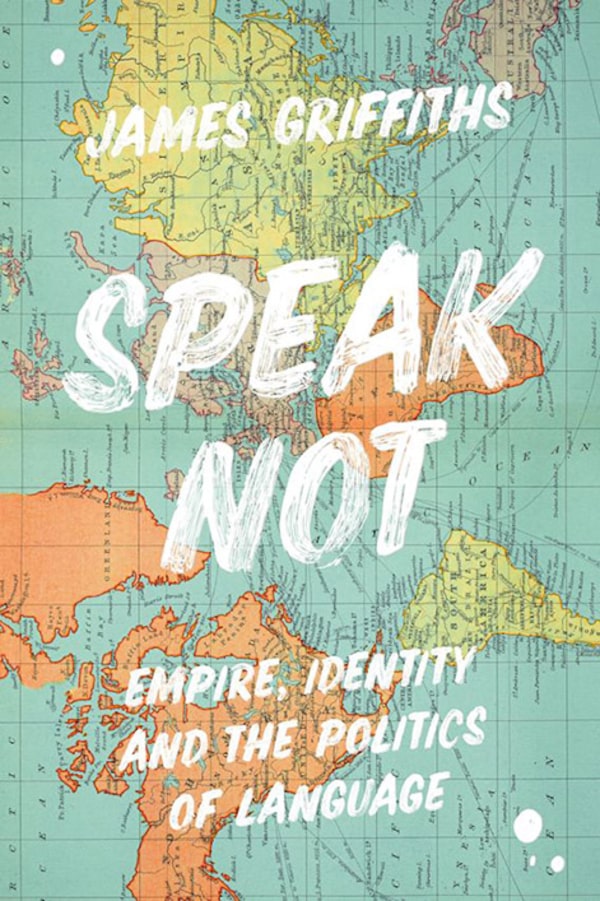
James Griffiths' new book, Speak Not: Empire, Identity and the Politics of Language, is a welcome addition to critiques of empire and studies of language policy and politics.Handout
- Title: Speak Not: Empire, Identity and the Politics of Language
- Author: James Griffiths
- Genre: Politics
- Publisher: Zed Books
- Pages: 264
The tendrils of empire are many and long. In our imaginations, the ideas of what imperialism entails range from nebulous forms of “influence” to soldiers’ boots on the ground, from ideal considerations to material considerations. The practice of contemporary imperialism picks up on these various tools of exploitation, extraction and domination; some are old, some are new – or are new forms of old practices. One enduring, fundamental form of imperialism is language. As a way of processing and sharing the world, language is fundamental to community, culture, commerce and even the self. That’s what makes it such a powerful tool of empire.
In the Tractatus Logico-Philosophicus, Austrian philosopher Ludwig Wittgenstein wrote “the limits of my language mean the limits of my world.” Language enables and constrains as it reflects and shapes our reality. To control language is therefore to control life and how it is lived. Contemporary struggles to preserve, promote and extend endangered and marginalized languages are thus struggles to preserve, promote and extend communities and even countries. In Speak Not: Empire, Identity and the Politics of Language (Zed, 2021), Globe and Mail Asia correspondent James Griffiths explores several examples of such efforts.
Primarily focusing on Welsh, Cantonese and Hawaiian languages, but delving into others by way of short interludes, Griffiths sets out in Speak Not on “… a multi-year journey to try and answer the question of why some languages succeed while others are driven to minority status or even extinction.” He undertakes this effort first and foremost as a journalist, telling the stories of at-risk languages and the people, communities and movements that surround them. However, his own story makes a few cameos. Born in Wales, living in China, and having reported from a handful of countries, he shares his own journey through languages, of his father’s return to learning Welsh and adventures with the Duolingo app, and more. These moments are welcome additions, further humanizing the stories of language, which are, ultimately, stories of people.
To the extent that there is a central thesis, Griffiths argues, “Languages are not lost, they are taken.” He’s right. And as a summary of the power dynamics of hegemony as they relate to language, there may be no better way to put it. He continues with the point that languages do not simply fade, writing, “They are uprooted by malice or neglect, their speakers assimilated into a new tongue, or left to struggle in the space between the fading old and the out of reach new.” Languages are threatened or lost to colonialism. They are not simply left to wither on the local vine. To think otherwise, Griffiths points out, is to serve the powerful.
The core stories in Speak Not surround three languages and their primary geographical homes, but there’s more to the effort. Beyond language, the book is about creeping empire and, above all, the power of education policy to shape reality. In that way, the book is about many languages at once, well beyond Welsh, Cantonese and Hawaiian. As Griffith notes, “While there are around 7,000 extant languages today, half the planet speaks one of just 23 tongues, with that proportion growing every year.” So, while we read about Welsh resistance, peaceful and violent, to English encroachment – ethnically and linguistically – or the U.S. overthrow of Hawaii’s government in the late 19th century and its attempt to extinguish the local tongue, we are also reading about the techniques of empire deliberately or incidentally applied throughout the world both in the past and present.

Speak Not: Empire, Identity and the Politics of Language, by James Griffiths, tackles both problems and solutions, tracing both threats to languages and resistance.Handout
It is easier to write a book about problems than it is to write a book about solutions. Speak Not tackles both, tracing both threats to languages and resistance. It’s through stories of the latter we learn of protest, civil disobedience, evolving state policy and new education efforts to pursue linguistic diversity. Griffiths writes “In education, decades of work in language revitalization has provided a clear model for minority tongues around the world. Work begins at home, encouraging and supporting parents to use their native languages, and in pre-schools, with immersion kindergartens or ‘language nest’ schemes showing success in numerous countries …” Just as educational policy was involved in dismantling local languages, it is now a key part of protecting them.
One risk with a book like Speak Not is that with so many stories to tell, so many languages to cover, so many narratives and counter-narratives to consider, and such a hefty history and present to sort through, the story will become overstuffed. Griffiths avoids this trap but falls into another. The book is too short and, at times, disjointed. Interludes that take the reader to South Africa and Israel are fascinating and welcome, but barely have we left Wales or Hawaii or China, still left with questions of who, what, where, when and how that feel rushed and unfinished. Sometimes it’s best not to leave the reader wanting more. One way around this shortcoming is to approach the book as a series of essays and vignettes. That helps, but it’s not ideal.
Whichever way you approach Speak Not, the book is a welcome addition to critiques of empire and studies of language policy and politics. Part history, part memoir, part policy critique, the volume succeeds at telling a universal tale through particular stories, including characters who remind us that the languages we speak –and speak not – are the worlds in which we live, and that such worlds are worth fighting for.
Expand your mind and build your reading list with the Books newsletter. Sign up today.